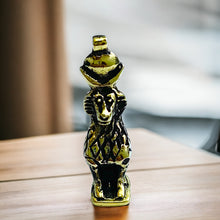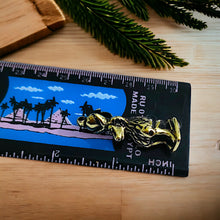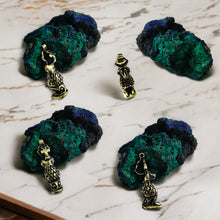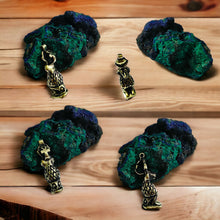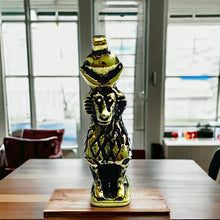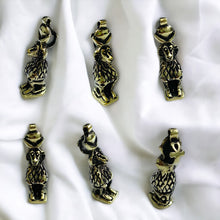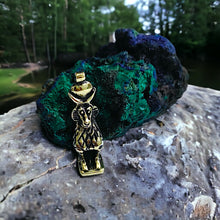
Crafted with meticulous attention to detail, the Gold Djehuty Baboon Pendant Necklace pays homage to ancient Egyptian symbolism. Inspired by the revered deity Thoth, depicted as a baboon, this pendant embodies wisdom and knowledge. Its design traces back to the rich cultural heritage of Egypt, where adornments like this were worn as symbols of divine protection and spiritual connection.
- History: Inspired by ancient Egyptian culture, symbolizing rebirth and protection.
- Spiritually: Represents transformation, renewal, and guidance in life's journey.
- Talisman: Believed to bring luck, ward off negativity, and offer spiritual protection.
- Handmade: Crafted with care and attention to detail, ensuring uniqueness in each piece.
- Healing: Thought to promote emotional healing and inner strength.
- Material: Made of Gold and Brass, known for its purity and durability.
- Symbolism: Scarab beetle symbolizes resurrection, eternity, and the cycle of life.
- How to Wear: Slide onto any chain up to 5mm thickness for versatile styling.
History Side For Those Who Are Interested
Djehuty, commonly known as Thoth in Greek mythology, is a prominent deity in ancient Egyptian religion and mythology. The history of Djehuty spans millennia, reflecting the evolution and intricacies of Egyptian religious beliefs.
Originating in the Predynastic Period (circa 3100 BCE), Djehuty's worship traces back to the earliest stages of Egyptian civilization. Initially, Djehuty was revered as a lunar deity associated with wisdom, writing, and the arbitration of disputes. He was often depicted as a baboon or as a man with the head of an ibis, symbolizing his association with these animals, which were considered wise and knowledgeable in ancient Egyptian culture.
As Egyptian civilization advanced, Djehuty's influence expanded, and his attributes became more diverse. He became associated with the moon, mathematics, science, magic, and the arts, earning him the epithet "Lord of Time." Djehuty was also believed to be the inventor of writing and the patron deity of scribes, making him essential in the development of Egyptian civilization.
Throughout Egyptian history, Djehuty's importance is evident in various texts, religious ceremonies, and funerary practices. He appears in religious texts such as the Pyramid Texts, Coffin Texts, and Book of the Dead, where he plays a crucial role in guiding souls through the afterlife. Djehuty's prominence extended beyond religious contexts, influencing secular affairs such as legal matters and medical practices.
During the Middle Kingdom (circa 2055–1650 BCE) and the New Kingdom (circa 1550–1070 BCE), Djehuty's cult reached its zenith. Temples dedicated to him were built across Egypt, with prominent centers of worship at Hermopolis and Khmun (Hermopolis Magna). These temples served as hubs for intellectual pursuits, education, and the preservation of knowledge.
Djehuty's association with wisdom and learning made him a revered figure among scholars and intellectuals. He was often invoked by those seeking knowledge, inspiration, and guidance in various fields of study. The scribes, who played a crucial role in Egyptian society, regarded Djehuty as their patron deity, attributing their skills and talents to his divine influence.
Despite the decline of ancient Egyptian civilization, Djehuty's legacy endured through the centuries. His worship persisted into the Greco-Roman period, albeit with syncretic influences from other cultures. Greek and Roman writers equated Djehuty with their own deities of wisdom and writing, further cementing his status as a universal symbol of knowledge and intellect.
In modern times, Djehuty continues to capture the imagination of scholars, artists, and spiritual seekers worldwide. His image and symbolism remain prevalent in popular culture, literature, and esoteric traditions, reflecting his timeless appeal as a symbol of wisdom, intellect, and divine inspiration.







